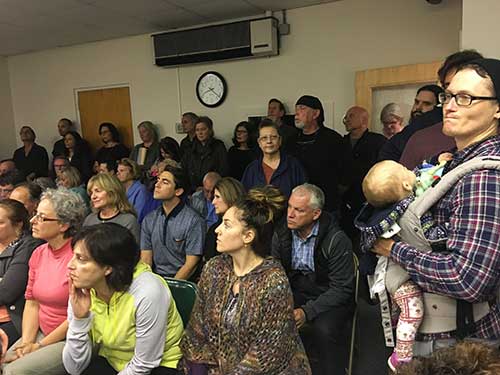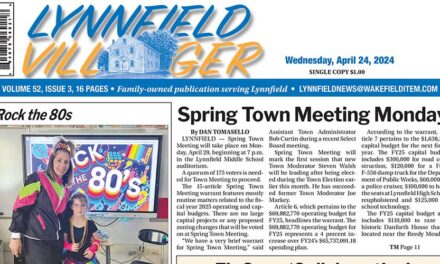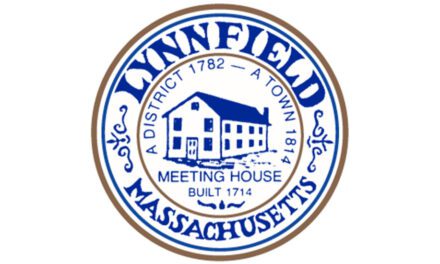Published in the October 10, 2018 edition
By DAN TOMASELLO
LYNNFIELD — The Zoning Board of Appeals ruled in favor of Boston Clear Water Company on Oct. 2.
Residents Mary Bliss, Andrew Gallucci, Willis O’Brien and John Sievers, who are represented by attorney Jason Kimball, filed a petition requesting the ZBA overturn Building Inspector Jack Roberto’s decision not to enforce three complaints against Boston Clear Water Company (BCWC), 165 Lowell St. Roberto said in a letter to the petitioners that he was “not convinced of the correctness” of the petitioners’ complaints.
The ZBA previously held three public hearings on the water company dispute. During the three-and-a-half hour Oct. 2 meeting, the Joe Maney Meeting Room in Town Hall was filled to capacity and featured people in support of the petitioners and the water company. A number of people were forced to sit on the floor due the amount of people in the room. The water company’s supporters came from as far south as Sudbury to as far north as Rockport.
Residents weigh in

THE JOE MANEY MEETING ROOM was full of opponents and supporters of Boston Clear Water Company during the Zoning Board of Appeals’ Oct. 2 meeting. (Dan Tomasello Photo)
Heather Sievers, 163 Lowell St., said BCWC has turned her family’s life upside down.
“Lynnfield’s first Zoning Bylaw was introduced in 1929, and its justification was to promote the health, safety, convenience and welfare of residents,” said Sievers. “By not enforcing its bylaw, the town of Lynnfield is failing to protect its citizens from costly and inherently unfair battles necessary to protect their property and well-being from deep pocketed businesses aiming to get their way through a war of attrition.”
Sievers said the former owners of Pocahontas Spring, the LeColst family, were respectful to abutters. She said the opposite is true with BCWC owner Anthony Gattineri and BCWC employees.
“(Gattineri’s) plan is to drive the neighbors out so he can expand his business without resistance,” said Sievers. “The strategy he is using is waging expensive and protracted legal battles with the neighbors until they can afford no more. It’s important for the (ZBA) to enforce the bylaws as precisely as they are written because families protected by the Zoning Bylaw in the residential district are being bled dry because their town is failing to enforce the Zoning Bylaw.”
Barry Paul, 190 Lowell St., said BCWC’s lights are on 24/7.
“It’s almost like a commercial enterprise on Route 1,” said Paul. “It’s a real eyesore and it’s very bothersome to the neighbors.”
ZBA member Anthony Moccia noted the lights located in front of the water company’s entrance were recently installed.
“I was surprised about the posture considering it is the 23rd hour,” said Moccia.
ZBA alternate member Andres Youngren agreed.
“I drive by there all the time and I had the exact thought,” said Youngren. “Why?”
Mary O’Brien, 155 Lowell St., said Pocahontas Spring Water was “closed and abandoned from the spring of 2012 through at least 2015.”
“My family and I had lived peacefully from 1989 to mid 2016 in our beautiful Lynnfield neighborhood,” said O’Brien. “Our lives have been turned upside down since the new water company owners took control. We loved the LeColst family. They were outstanding neighbors and never interrupted our lives. This isn’t about the quality of water. This is about the quality of our lives and the town backing us up. It’s a disgrace that we have to plead our very expensive cases in front of this board. I am asking you to let us live in peace.”
O’Brien also said BCWC has had a negative impact on children living in the neighborhood. She said having water tankers going to and from the property creates safety issues.
“There never used to be tankers and we have been there for almost 30 years,” said O’Brien. “That’s a concern because children ride their bikes back and forth, and people take walks.”
ZBA Chairman Brian Shaffer repeatedly told the water company’s supporters not to speak about the quality of the spring water. That simple request was constantly ignored.
Beverly resident Debra Dow-Spielman and her husband brought their nine-month-old infant to the meeting because they wanted to show their support for Boston Clear Water. During visits to the water company, she said she likes to “thank the water.”
“It’s past my daughter’s bedtime, but we have to be here,” said Dow-Spielman. “She is homegrown on this water. We have only drank this water for 21 months. I am very sympathetic to the pain of the neighborhood, but I am very confused as to what the trauma could possibly be from such a gorgeous, empowering, quiet business that is healing. Thank God for the water. It’s pure goodness.”
Grey Lane resident Scott Considine said BCWC’s abutters have unfairly treated Gattineri.
“I am at the point of disgust,” said Considine. “I have been to this location numerous times, and it’s nothing but peaceful, clean and well-kept. This is the same guy who offered free water to our football program, flag football program, baseball program and soccer program. There is nothing wrong. What the (abutters) are doing is a witch hunt and a travesty.”
Gattineri said he had to install LED lights at the property because of intruders. He said the lights were dimmer than the old lights.
“They are for safety purposes,” said Gattineri.
Gattineri also lashed out at petitioners John Sievers and Willis O’Brien during the meeting.
“All we are doing is making sure people get water,” said Gattineri. “The lighting issue and this whole meeting is the biggest farce and a scam.”
After Gattineri concluded his rant, BCWC attorney Julie Connolly turned to her client and quietly advised him to stop speaking.
“We will take a look at the lighting,” BCWC attorney Brian McGrail told the ZBA. “We hear the message loud and clear.”
ZBA decision
While Shaffer originally proposed continuing the discussion to the board’s Nov. 13 meeting, Connolly objected to the request.
“It’s extremely important to wrap this up tonight,” said Connolly.
The ZBA rejected the petitioners’ first complaint, which accused BCWC of unlawfully practicing a commercial use in a residential district.
“There has been a lot of evidence that this operation existed prior to zoning adoption,” said Shaffer. “This is a lawful preexisting use and this is a grandfathered use.”
“I would agree with that based on the evidence and the historical use of the property,” added ZBA alternate member John Fallon.
The ZBA also voted 3-0 that the petitioners did not meet the burden for the third complaint, which stated the 165 Lowell St. property was abandoned for two years.
“Abandonment is an extremely difficult thing to prove in my opinion,” said Shaffer. “They might not have used it, but our bylaws don’t allow a non-use to constitute abandonment.”
Moccia concurred with Shaffer’s opinion.
“It is my view that the petitioners have not met their burden because it is such a high standard to establish abandonment,” said Moccia. “I don’t think there is sufficient evidence to carry the petitioners’ burden that the use was abandoned.”
The ZBA ruled in favor of the petitioners that they were not procedurally barred from bringing the three complaints forward. The petitioners initiated a similar complaint in August 2017, which was subsequently withdrawn without prejudice last fall.
In addition to the three votes taken, the ZBA did not make a decision on the second complaint, which was that commercial activity is not lawfully permitted at the 165 Lowell St. property “as a lawful preexisting nonconforming use prior to the adoption of zoning in Lynnfield” in 1929.
The ZBA also did not determine whether the water company is a public water supply allowed by right and whether the company illegally expanded.
The board continued discussions on those matters to its Nov. 13 meeting.




